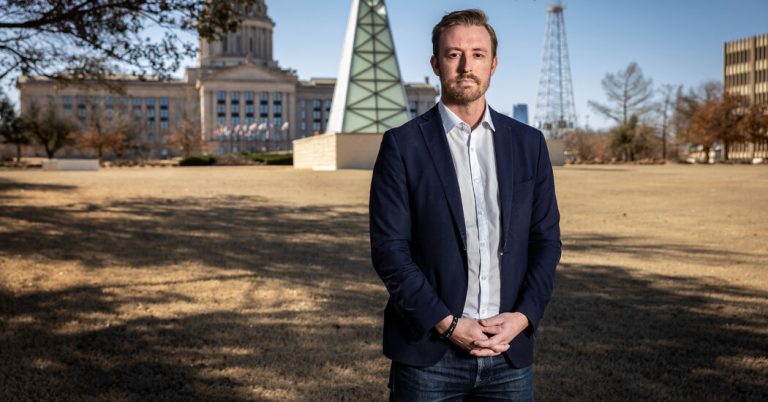Oklahoma’s state superintendent on Thursday required all public schools to teach the Bible, including the Ten Commandments, in a remarkable move that blurs the lines between religious instruction and public education.
The superintendent, Ryan Walters, who is a Republican, described the Bible as an “indispensable historical and cultural touchstone” and said it should be taught at certain, unspecified grade levels.
The move comes a week after Louisiana became the first state to mandate that public schools display the Ten Commandments in every classroom, a move that was quickly challenged in court.
Oklahoma’s directive could also be challenged and is likely to spark another battle over the role of religion in public schools.
Efforts to introduce religious texts into the classroom reflect a growing national movement among conservatives—especially Catholics and evangelicals who oppose abortion, transgender rights and what they see as liberal school curricula—to openly embrace the idea that the America’s democracy must be founded on Christian values.
That movement had a major victory overturning Roe v. Wade two years ago, and its supporters see ending abortion as just one starting point in a broader campaign to preserve and expand the presence of their Christian values in American life. Many conservative Christians see schools as the frontier of their struggle as they seek to shape the next generation.
In his announcement Thursday, Mr. Walters called the Bible “an essential historical document to teach our children the history of this country, to fully understand Western civilization, to understand the basis of our legal system.”
“Every teacher, every classroom in the state will have a Bible in the classroom and teach from the Bible in the classroom,” he said.
In some states, the Bible has been taught as part of specific courses and is generally considered permissible as a historical text or alongside other religious texts or literature. But few, if any, other states have issued such a broad requirement.
In a memo to school district leaders, Mr. Walters did not immediately clarify what the biblical directive would entail.
He suggested that the Bible and the Ten Commandments could be referred to “as an appropriate study of history, culture, ethics, comparative religion, or the like.” And he said they could be studied “for their substantial influence on our nation’s founders and the fundamental principles of our Constitution.” This seems to suggest a core tenet of conservative Christian political ideology that the nation was founded specifically to be a Christian nation—an idea that many mainstream historians dispute.
Stacey Woolley, the school board president for Tulsa Public Schools, which Mr. Walters has threatened to take over, said she had not received specific instructions about the curriculum but believed it would be “inappropriate” to teach students of different faiths and backgrounds quotes only from the Bible, not including other religious texts.
It is not clear whether Mr. Walters has the authority under Oklahoma law to issue such a sweeping directive to all public schools, said Andrew C. Spiropoulos, a professor of constitutional law at Oklahoma City University School of Law, who described the command that he was pushing “the edge of the envelope.”
Generally, he said, courts have ruled that the Bible can be taught in public schools alongside other religious texts or in conjunction with other literary works.
“This could be legally problematic by singling it out as a stand-alone proposal,” Mr. Spyropoulos said.
Mr. Walters, a 39-year-old conservative Christian and former history teacher, has emerged as a bombastic figure in Oklahoma politics and an unapologetic culture warrior in education. He has been at the center of controversies over gender identity, the teaching of race and other hot-button issues, and has occasionally railed against school districts and individual teachers.
Mr. Walters also expressed his support for prayer in public schools and supported an effort to create the nation’s first religious school in Oklahoma. (Earlier this week, the Oklahoma Supreme Court blocked that school, in a case that could end up before the U.S. Supreme Court.)
His Bible Directive faced immediate pushback, from groups including Americans United for Separation of Church and State, which also filed a lawsuit to stop the religious charter school in Oklahoma.
Rachel Laser, president of Americans United, said the group is “ready to step in and protect all Oklahoma public school children and their families from constitutional violations of their religious freedom.”
“Public schools are not Sunday schools,” he said, adding, “Public schools may teach about religion, but they cannot preach any religion.”
Ms. Laser’s group is also challenging Louisiana’s Ten Commandments measure, which requires the commandments to be displayed in every classroom at every public elementary, middle and high school, as well as in classrooms at public colleges. It will also include a statement asserting that the Ten Commandments have been “a prominent part of American public education for nearly three centuries,” reflecting proponents’ claim that the Ten Commandments are not purely a religious text but a historical document.
Groups such as the National Association of Christian Lawmakers, which was founded in 2020 to promote legislation aligned with their Christian values, have coordinated with lawmakers to push several recent measures. NACL specifically worked with legislators in Florida, Louisiana and Texas to pass bills allowing public schools to employ chaplains.
The country appears to be divided over religious instruction in public schools, according to a survey last year by the Associated Press and NORC, an independent research institute at the University of Chicago. Among respondents, 37 percent said there was too little religion, 31 percent said there was just the right amount, and 31 percent said there was too much.




